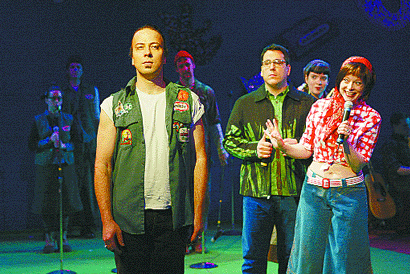Vineyard Theatre scores with material that risks going off the beam; Scottish have less success
Sometimes “quirky” works—when a unique perspective or series of perceptions come together to create a show that, if not perfect, gets a lot of credit for being “out there,” for breaking a few rules and taking a chance. In the case of “People Are Wrong,” the story is “Mr. Blandings Builds His Dream House” meets “E.T.,” and it probably pays not to look too closely or the cracks in the narrative become glaringly apparent.
However, the show is fresh, inventive and colorful with a company that’s talented and appealing, and when you dig right down the story is a satirical grab-bag that pokes fun primarily at city dwellers in the country and ego-driven leaders.
The book is by Julia Greenberg and Robin Goldwasser and it follows the travails of Russ and Terri who have bought a home in upstate New York and are trying to do some renovations in time to hold their wedding in the garden. They hook up with Xanthus, a landscaper who happens to come from another galaxy and uses the gardening project as an excuse to build a runway for his ship to return to his original planet. That’s pretty much all the plot there is, but Greenberg and Goldwasser have a skewed and ironic sense of humor that generates some real belly laughs—as in defining the third dimension as Olive Garden and Applebee’s. It’s a balance of highbrow intellect and low humor that makes this show.
The score is by John Flansburgh of “They Might Be Giants,” and he also appears as Russ. Flansburgh has a keen ear for the pop idiom (as evidenced by some recent Play-Doh commercials for which he wrote the jingle) and a way of pushing the harmonics just slightly beyond what might be expected to keep the songs interesting and oddly tuneful.
The cast is full of strong performers who hit just the right pitch of ironic detachment throughout, and who have the technical proficiency to make it work. In particular, Goldwasser as Joyce, the Agway manager, is a terrific singer and a powerful performer—particularly when she has to be the voice of doom and reveal the plot’s tabloid-esque secret. Also terrific are Flansburgh, Chris Anderson as Chainsaw Dick and Erin Hill as Terri. Less impressive is David Driver as Xanthus who never really seems like the charismatic type who can create a cult.
The production is a joint venture between the Vineyard and the Target Margin Theatre. The latter’s vision is to offer work that diverges from reality. In “People Are Wrong,” they have succeeded, and if you can join them in letting go of a strict adherence to form, you will be entertained, even if you can’t always put your finger on why this show works.
Carol Tambor may also qualify for the term “quirky.” For the past several decades, she has regularly been attending the Edinburgh Fringe Festival, and she has been so impressed by some of the theater there that she raised money to start a foundation and import the “best” of the festival for New York audiences. All very well and noble until you realize that it’s what Tambor personally thinks is best that makes the cut and if these shows really are “the best,” I would suggest saving the airfare and avoiding Edinburgh in August.
Of the two shows recently presented on a double bill as “The Best of Edinburgh,” only one, “Sisters, Such Devoted Sisters,” has any merit at all. Playwright and performer Russell Barr created a bleak and moody portrait of the life of a transvestite in Glasgow. It is a grim tale and at times seems to lose its way, but Barr brings a level of honesty and availability to the role that lays bare the deep-seated, nearly pathological, anger, pain and destructiveness of the unnamed young man who is the subject and center of the piece. The piece was performed in dim light, and the character, at times almost inaudible, quite literally seems to pull himself together only enough to talk to the audience and then slowly but inexorably unravels. As the young man winds down, the story tends to fall apart, too, and while emotional truth survives through the unhappy ending, the audience seems to get left behind as the depression of the character takes off.
“Rosebud—The Lives of Orson Welles” is, on the other hand, a more traditionally structured monologue. Christian McKay bears quite a resemblance to the young Orson Welles, and he evolves into the older Welles with a facility that is completely impressive. He is a fine performer, which is fortunate because he’s been given a wretched play to work with.
Playwright Mark Jenkins has put together a series of vignettes from Welles’ life but he does no digging for character or motivation. He delves about as deeply into his subject matter as the “Up Close and Personal” segments of the Miss Universe pageant—all highlights and plastic—and the result is nearly unspeakably boring. McKay’s impersonation can’t compensate for the shallowness of the script and the irrelevance of the subject matter. Who cares about Orson Welles? Jenkins fails to give us reason to remember that film icon. This is a play that starts with nothing to say and goes downhill from there. In the lobby afterward, one woman turned to a friend and said with a sigh, “I am so glad I told my husband to stay home.” More to the point, this homage––and Tambor herself––should have stayed home, as it were.

































